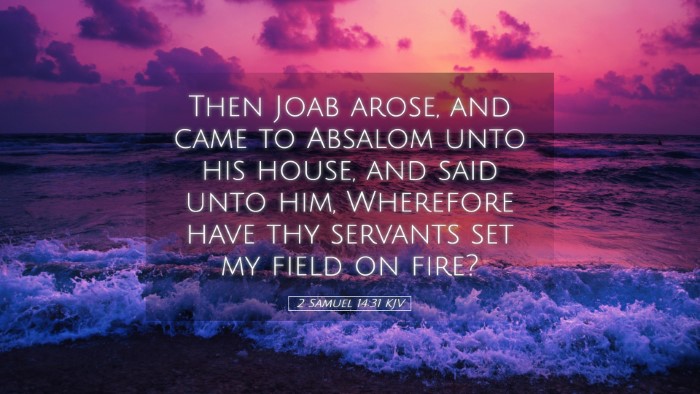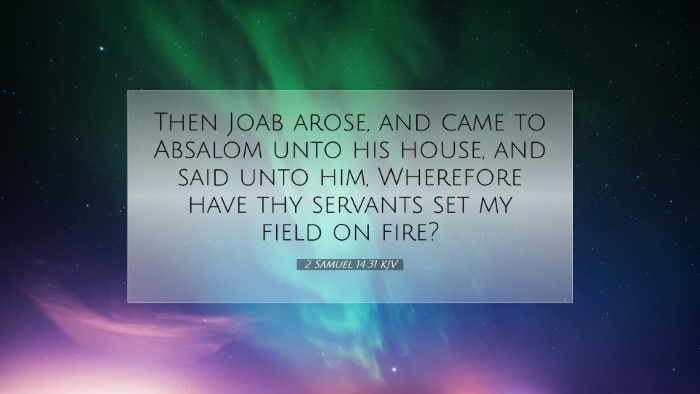Commentary on 2 Samuel 14:31
Verse Reference: 2 Samuel 14:31
“Then Joab arose and went to Absalom unto his house, and said unto him, Wherefore have thy servants set my field on fire?” (KJV)
Contextual Background
This verse falls within a pivotal narrative in the life of King David, reflecting the tensions between David's family and Joab's complicated allegiance. The political intrigue and familial strife that characterize this part of scripture reveal deep insights into leadership, rebellion, and the nature of sin.
Summary of Commentary Insights
1. Joab's Role and Motivation
Matthew Henry notes that Joab, the commander of David's army, was a man whose motivations were often intertwined with personal ambition and loyalty to the crown. His visit to Absalom can be seen as both an inquiry into the motivations behind the conflagration of the field and a subtle warning of the consequences of rebellion. This highlights Joab's pragmatic approach to political maneuvering.
2. Rebellion and Consequences
Albert Barnes elaborates on the broader implications of Absalom's actions and the emotional undercurrents within David's household. The act of burning the field, a significant resource, symbolizes Absalom's desperate attempt to gain attention and express his grievances against the king. While it serves as a call for reconciliation, it simultaneously exemplifies the chaotic nature of his rebellion.
3. The Importance of Communication
Adam Clarke emphasizes the necessity of communication in familial and leadership relations. Joab's confrontation with Absalom signifies a crucial moment where dialogue is essential. The verse encapsulates the confrontation between authority and rebellion and urges the reader to consider the importance of addressing grievances before they escalate into destructive actions.
Theological Reflections
The interaction between Joab and Absalom in this verse is rich with theological implications. It raises pressing questions about authority, rebellion, and the pursuit of reconciliation. The responses to conflict seen here can be connected to broader Biblical themes surrounding the need for humility, repentance, and the pursuit of peace.
1. Authority and Submission
The dynamic between Joab and Absalom can be reflective of the Christian understanding of authority and submission. Joab's position as a leader obligates him to confront rebellion, while Absalom’s actions express a deep-seated need for recognition and resolution. This tension mirrors modern-day themes in church leadership, where issues of authority must be balanced with compassion.
2. Sin and Its Consequences
This passage reflects the nature of sin as it complicates relationships and leads to tragic outcomes. The destructive course of rebellion is illustrated as personal grievances lead to collective consequences. Pastoral insights can be drawn to address the reality of sin in congregational life and the necessity for accountability and forgiveness.
3. The Path to Reconciliation
Absalom’s act reflects the desperate need for reconciliation. Clarke's observation that actions speak louder than words is pertinent; the burning of Joab's field should serve as a profound appeal for dialogue and mediation. This passage encourages leaders to be proactive in seeking peace, rather than waiting for conflict to escalate.
Practical Applications for Leaders and Scholars
- Encouragement for Open Dialogue: Leaders should foster environments where grievances can be voiced and addressed before they manifest in destructive actions.
- Understanding the Heart of Rebellion: Scholars should examine the emotional and spiritual dynamics that lead to rebellion within any community, addressing root causes rather than just symptoms.
- Modeling Humility and Repentance: Both leaders and congregants are called to approach conflicts with humility, willing to repent where necessary and strive for resolution.
Conclusion
2 Samuel 14:31 serves as a poignant reminder of the complexities of human relationships, authority, and the need for reconciliation. The insights drawn from the commentaries of Matthew Henry, Albert Barnes, and Adam Clarke emphasize the timeless nature of these struggles in both historical and modern contexts, beckoning leaders and scholars alike to navigate similar challenges with wisdom and grace.


